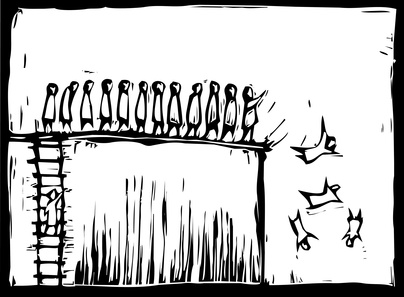Toxic Followership
by lind7496 • August 15, 2013 • Uncategorized • 0 Comments
 Cyberspace and bookshelves are littered with exposés of leadership gone awry and the culpability of countless followers that enable this brand of toxic leadership. This blog will not go into those larger-than-life characters and their feckless followers, instead, this blog is about you. Yes, YOU!
Cyberspace and bookshelves are littered with exposés of leadership gone awry and the culpability of countless followers that enable this brand of toxic leadership. This blog will not go into those larger-than-life characters and their feckless followers, instead, this blog is about you. Yes, YOU!
There are regular folk day-in and day-out that enable toxic leadership on routine levels. We often focus on the fallibilities of the leaders, but now is the time for more followers – like YOU – to take accountability.
Are you following the right thing?
I had my “last straw” moment at my church. In Bible study, the pastor taught from Numbers 18. A story of devoted soldiers of God who were taken care of in a divine way by the fruits of war. Our pastor, thus believed that he should get 10% of the tithes and offerings as indicated in this passage. I struggled because I couldn’t quite make the connection. I dared to ask a question of him in Bible study. I was admonished by peers for not following the pastor. My benchmark was to follow God and our success should not be measured by paying butts in seats but by souls in heaven.
What is your benchmark? Are you following the right principles? Will it accomplish the outcome that you really want? Or is it benefiting something (or someone) completely different?
Are you a toxic Pigpen?
Pigpen is a character in the comic strip Peanuts and friend of Charlie Brown. He is known to be perpetually dirty and is depicted with a cloud of dirt and dust that follows him around.
These people believe that leaders should be infallible. Since they are not, leadership mistakes are given exceptional attention and blown up in their minds to be examples of toxic environments. These people create toxic mountains out of the molehills of leadership boo-boos. They thrive in making others “dirty” in their own personal toxic environment.
Many of the world’s greatest leaders made mistakes. Mother Teresa accepted charitable donations from questionable sources; Martin Luther King was accused of questionable personal lapses; and Nelson Mandela had years in prison to reconsider some of the tenets and beliefs that he no longer espoused. To accuse any of these great leaders as examples of toxic leadership due to those unfortunate toxic moments would be outrageous. Yet, a toxic Pigpen would.
These people can be recognized by the way they use organizational grapevines. They spread their toxicity quite efficiently and effectively. Do the same leadership problems follow you from job to job even when the leader changes? Do you find ways to feel justified by pointing out others mistakes? Perhaps it is time to get a mirror and address this problem directly.
Are you gullible?
One trait that toxic leaders and “good” leaders have in common is charisma. The ability to attract followers and get them to believe in something bigger than themselves. But what’s the difference between a “grand vision” and a “bold lie”? Perhaps it’s in the eye of the beholder. But the answer lies in examining what makes us gullible and vulnerable to believing that lies are truth.
Science Daily, in its article, Life’s Harsh Lessons ‘Make You More Gullible’, notes a University of Leicester study that says, “…[p]eople who have suffered life’s hard knocks while growing up tend to be more gullible than those who have been more sheltered…” Events in their life cause them to doubt their own judgment.
This isn’t to say that one must be cynical to put an end to your career as a toxic follower. But to do this you must “trust, but verify”. In the example of my former pastor, I looked up the bible scripture myself. I found that he was leading us down a very narrow path of interpretation to persuade us to follow his bold vision for changing the administrative processes of the church and get more paying butts in seats.
These are just three suggestions and of course, the issue is more complicated than this. But, putting an end to Toxic Leadership requires putting an end to Toxic Followership. Leaders wouldn’t be leaders if they had no followers. There is no better antidote for toxic leadership.
